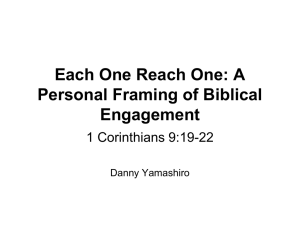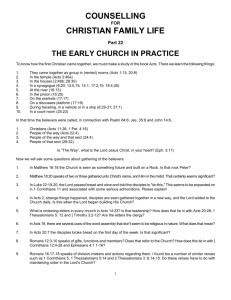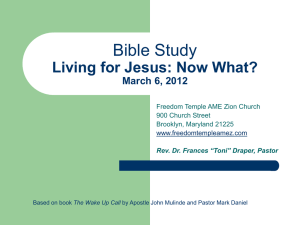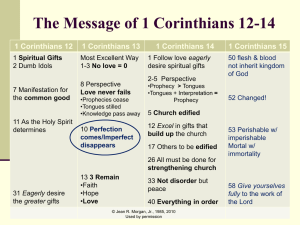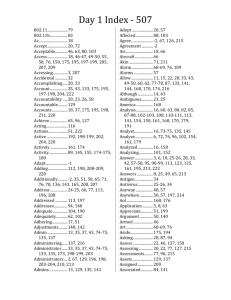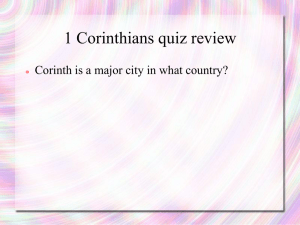Dispelling the Myth Seminar
advertisement
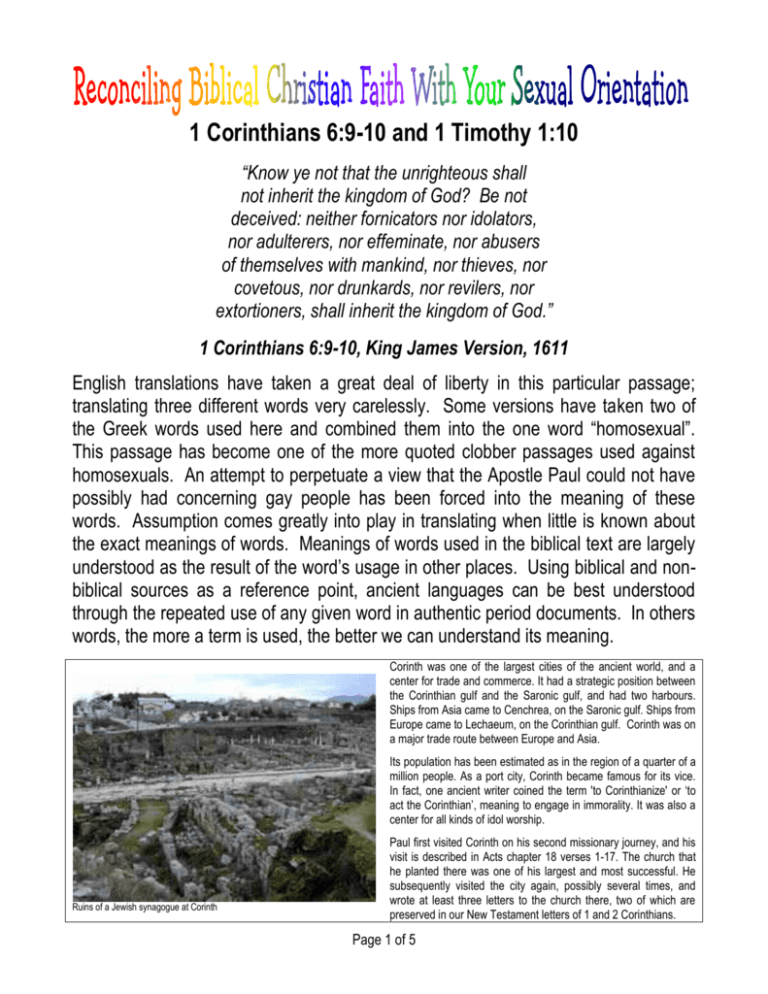
1 Corinthians 6:9-10 and 1 Timothy 1:10 “Know ye not that the unrighteous shall not inherit the kingdom of God? Be not deceived: neither fornicators nor idolators, nor adulterers, nor effeminate, nor abusers of themselves with mankind, nor thieves, nor covetous, nor drunkards, nor revilers, nor extortioners, shall inherit the kingdom of God.” 1 Corinthians 6:9-10, King James Version, 1611 English translations have taken a great deal of liberty in this particular passage; translating three different words very carelessly. Some versions have taken two of the Greek words used here and combined them into the one word “homosexual”. This passage has become one of the more quoted clobber passages used against homosexuals. An attempt to perpetuate a view that the Apostle Paul could not have possibly had concerning gay people has been forced into the meaning of these words. Assumption comes greatly into play in translating when little is known about the exact meanings of words. Meanings of words used in the biblical text are largely understood as the result of the word’s usage in other places. Using biblical and nonbiblical sources as a reference point, ancient languages can be best understood through the repeated use of any given word in authentic period documents. In others words, the more a term is used, the better we can understand its meaning. Corinth was one of the largest cities of the ancient world, and a center for trade and commerce. It had a strategic position between the Corinthian gulf and the Saronic gulf, and had two harbours. Ships from Asia came to Cenchrea, on the Saronic gulf. Ships from Europe came to Lechaeum, on the Corinthian gulf. Corinth was on a major trade route between Europe and Asia. Its population has been estimated as in the region of a quarter of a million people. As a port city, Corinth became famous for its vice. In fact, one ancient writer coined the term 'to Corinthianize' or ‘to act the Corinthian’, meaning to engage in immorality. It was also a center for all kinds of idol worship. Ruins of a Jewish synagogue at Corinth Paul first visited Corinth on his second missionary journey, and his visit is described in Acts chapter 18 verses 1-17. The church that he planted there was one of his largest and most successful. He subsequently visited the city again, possibly several times, and wrote at least three letters to the church there, two of which are preserved in our New Testament letters of 1 and 2 Corinthians. Page 1 of 5 1 Corinthians 6:9-10 and 1 Timothy 1:10 Fornication The King James Version has assigned the “fornicater” as the meaning for the Greek word pornos (#4205) used in this passage. The word fornication in the year 1611 meant “voluntary sexual intercourse between a man and an unmarried woman.” The word pornos, however literally means “male prostitute”. Together with its counterpart porne (#4204) which refers to female prostitutes (harlots), both are derived from the root word porneia (#4202) meaning “harlotry”. The more modern translations have used an even more indistinct term “sexual immorality” (New International Version) which has a much broader connotation and is way beyond the original meaning of the text. In his much used reference manual, Greek-English Lexicon of the New Testament, J. H. Thayer admits that a much broader term “must be adopted in these passages”….because we have learned “how leniently converts from among the heathen regarded this vice and indulged in it”. In other words, he says, ‘we must modify our translation of the Word of God so that we can ensure a general condemnation of sexual acts outside of marriage regardless of what the text actually says. God did not put it just right, so we must, therefore, correct him.’ Effeminate The second word malakoi (#3120) is found in the New Testament only three times (Matthew 11:8, Luke 7:25, and 1 Corinthians 6:9). It has a double meaning in the Greek much like words in English. An example is the word light. Its usage in a sentence determines its meaning whether it is referring to heaviness or a source of illumination. In much the same way, malakoi literally means first “softness” as it applies to the feel of fine fabric. Secondly, the word is used to describe a character flaw, and in this case it means “weak willed” or “easily beguiled”. Our modern slang expression “softy” used to describe someone who is soft hearted, kind and easy to get along with seems closer to the meaning, except that it has a positive connotation. But malakoi has something to do with a moral weakness in context. It is perhaps that inability of some to maintain moral integrity and be self-controlled because of the ineptitude of their Page 2 of 5 1 Corinthians 6:9-10 and 1 Timothy 1:10 convictions and the lusts of their heart. The word better fits the pattern we see in our modern culture to those who are addicts. Addictions to various drugs, alcohol or sex is a common problem in our culture and translating this word to addicts would not only make more sense in the context, but would be in keeping with the meaning of the word. The Latin Vulgate translated malakoi to the word “mollis” which has exactly the same meaning, but the word “mollis” became a slang expression that referred to men who wore silky refined clothing. This meaning undoubtedly explains why the King James Version used the “effeminate”. In one translation, malakoi became “Catamite” which was a young boy slave used sexually by his master. Another translation uses the word “lecchouris” (lecherous) and another “voluptuous” and still another “sissies”. The multiple ways we see this word being translated is a testimony to the confusion of the translators and biblical scholars and evidence of an attempt to prejudice scripture against homosexuals. Abusers of Themselves With Mankind The third word, arsenokoitai (#733) is used only twice in the New Testament (1 Corinthians 6:9 and 1 Timothy 1:10). Its meaning is at best questionable. If it refers to homosexuals, the question arises why Paul would have used such an obscure and questionable term when he could have used other much clearer terms to describe what he meant. The Greek culture was filled with homoerotic words used to describe various homosexual relationships, but instead he used a word that does not appear anywhere in Greek homoerotic literature. Transliterated, the word arsenokoitai could mean “man-active-bed”. It could mean a male prostitute who takes the active role sexually. Modern day male prostitutes are differentiated by their trade, either for women, “gigolos” or for men, “hustlers”. Similarly, the Greeks also may have identified prostitutes by their trade. If Paul had wanted to condemn a group more inclined to be exclusively homosexual, he might have chosen the term arenokoitai (“man-passive-bed”) which would indicate a male prostitute who takes the passive role sexually. The King James Version avoids a direct translation of this word with the phrase “abusers of themselves with mankind”, but it is interesting to note that even though Page 3 of 5 1 Corinthians 6:9-10 and 1 Timothy 1:10 the word homosexual did not exist at the time and wasn’t even coined until the late 19th century, a word existed in 1611 which if used by the King James translators would have left no question as to what they were talking about. This word is “invert”, which meant homosexual, but they did not use it. More in keeping with the context in both this passage and in 1 Timothy 1:10, a suggested better translation might be “rapist” since it has something to do with someone who takes the active role in the sex act. The following chart demonstrates how ridiculous and farfetched some of the translations have gone with this passage. TRANSLATION YEAR RENDERED AS Koine Greek Latin Vulgate Wyclif Tyndale Reims-Douai King James Authorized Version The Revised Version American Standard Version Revised Standard Version Jerusalem Bible (French) Interlinear Greek-English New Testament The Amplified Bible New American Standard Bible Today’s English Version Jerusalem Bible (German) Jerusalem Bible (English) The Living Bible New International Version English Version For The Deaf 56 405 1508 1525 1609 1611 malakoi mollis lecchouris weaklings effeminate effeminate arsenokoitai masculorum concubitores synne of Sodom abusers of themselves with mankynde liars with mankind abusers of themselves with mankind 1881 1901 1946 1955 1958 effeminate effeminate 1958 1963 1966 1968 1968 1971 1978 1987 New Revised Standard Version The Message 1989 1993 those who participate in homosexuality effeminate Homosexuals homosexual perverts sissies child molesters Catamites Sodomites homosexuals male prostitutes homosexual offenders men that let other men use have sex with other men them for sex male prostitutes Sodomites those who use and abuse each other (sexually) abusers of themselves with men abusers of themselves with men sexual perverts effeminate people with infamous habits voluptuous persons Sodomites Page 4 of 5 1 Corinthians 6:9-10 and 1 Timothy 1:10 These obvious mis-translations do not exonerate the prevalent homosexual promiscuous lifestyle, for clearly Paul’s condemnation is against unbridled promiscuity in any form, homosexual or heterosexual. It is, therefore, the responsibility of gay Christians to redefine “gay-ness” as it relates to Spirit controlled Christian living; operating as new creatures before Jesus Christ who is Lord; setting an example to all unbelievers as a demonstration to everyone that they truly are the children of God. “Because those who are led by the Spirit of God are sons of God.” Romans 8:14 Page 5 of 5
